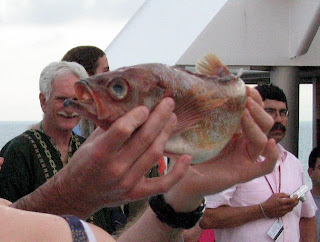 (The fish. Photo by Carol Walker.)
(The fish. Photo by Carol Walker.) The Executive Dean, John Burkoff, was King Neptune, and Nancy Burkoff, his wife, was Neptune's wife. The Academic Dean, David Gies, was the herald who did all of the talking for the court. There were a bunch of crew, staff and faculty members in King Neptune's court. The polywogs were invited to show their worthiness to become shellbacks by 1) having some green gunk poured over their heads, 2) diving into the swimming pool, 3) kissing a fish (yes, a real, scaly, dead fish), and 4) kissing King Neptune's ring. Then, those who wanted to had their heads shaved. A surprising number of people did this, men and women alike. (Many people got Mohawks rather than a buzzcut. This was a bit of a problem in Ecuador. For some reason, the Mohawk haircut seems to cause a cultural problem in this country, so those who had them were encouraged to get them shaved.)
On July 4th, we also had classes all day. Dinner that evening was a special barbecue on the pool deck. The cooks prepared hamburgers, hot dogs, bbq beef ribs, baked beans, French fries, salads, and other goodies typically eaten at a Fourth of July barbecue. We also had ice cream and cake to celebrate. After the BBQ, we had our logistical preport.
This might be a good time to talk about the food on the ship. It's not 5-star cuisine, but it's not bad, either. At breakfast, we have fried potatoes, eggs in various configurations, a meat, and biscuits and gravy. There are also options for cold and hot cereals, and toast. For lunch and dinner, we generally have salad fixings, potatoes of some sort, a fish dish, a meat dish, and a vegetable or two. There is always a vegetarian option or two, and a soup and sandwich option. The dining room staff is exceptional! Within 3 days of boarding, I didn't have to tell them that I took cream in my coffee; they just added it automatically.
Around 3 am that night, the pilot boarded the ship. When we stopped to allow the pilot to board, the ship underwent some turbulence. I was woken up by a really strong side to side rocking motion, but it only lasted an hour. We were safely docked in Guayaquil, Ecuador at 7am on the 5th, where we welcomed two diplomats from the American consulate here. The American consulate in Guayaquil is one of two U.S. consulates in Latin America and it is the oldest U.S. Consulate in this hemisphere, having been established in the mid-nineteenth century.